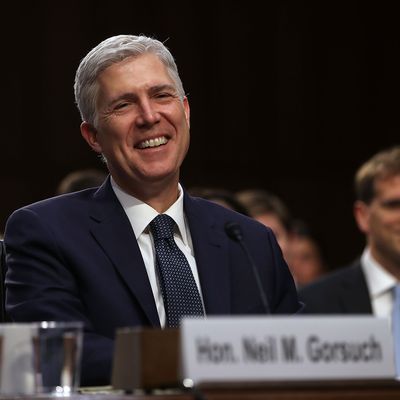
After two days of imperturbable testimony before the Senate Judiciary Committee, including a long day of questioning from senators, Neil Gorsuch suddenly faces a challenge from the least expected direction imaginable: the Court he has been nominated to join.
This morning, just as day three of Gorsuch’s confirmation hearings began, SCOTUS released a unanimous opinion in a special-education case arising in Colorado that overturned a Tenth Circuit decision that in turn relied on a 2008 opinion written by — you guessed it — Neil Gorsuch. To make a long and complicated story short, SCOTUS decided that a Tenth Circuit standard for school districts applying the Individuals with Disabilities Education Act (IDEA) that required them only to add some limited value to the educational attainments of special ed students was in error and denied these students their right to a individualized plan and a real chance to progress. That now-overturned standard was most clearly articulated, and arguably was developed, by Gorsuch.
Gorsuch was immediately asked about this development twice, once by his ally Chuck Grassley and later by the less-sympathetic Dick Durbin.
Watch Gorsuch’s full response to Durbin’s line of questioning in the video below.
He blandly responded that he had been bound by both Supreme Court and Tenth Circuit precedents, reflecting his now-familiar defense in controversial territory that he’s just a nonideological judge carefully applying settled law. But as Ian Millheiser at Think Progress quickly noted, that’s more than a bit disingenuous:
In a 1996 opinion, Gorsuch’s court held that “the ‘benefit’ conferred by the [IDEA] … must be more than de minimis.” It set a floor. Whatever benefits the law provides to disabled students, it cannot simply be de minimis.
Gorsuch’s opinion in Luke P., by contrast, added the word “merely” to this framework. Under Luke P., the benefits offered to a disabled student “must merely be ‘more than de minimis.’” That one word effectively transformed the floor that the court placed below disabled students in 1996 into a ceiling. Gorsuch transformed a rule instructing school districts that they must do more than nothing into a rule instructing them that they don’t need to do any more than a little more than nothing.
Later Amy Klobuchar brought up the subject again, in an exchange one liveblog of the hearings highlighted:
Sen. Amy Klobuchar, D-Minn., referred to the U.S. Supreme Court decision on Wednesday in a case interpreting the Individuals with Disabilities Education Act, which requires an appropriate public education for students with disabilities. The decision unanimously rejected the standard used by Gorsuch in IDEA cases before his court, which required schools to provide educational benefits that were merely more than de minimis….
Gorsuch said the Supreme Court accepted the case because of a circuit split on the issue. The 10th Circuit standard wasn’t out of the mainstream, he said.
Kinda depends on your definition of “mainstream,” doesn’t it?
Any way you look at it, though, the timing of the SCOTUS decision throws Gorsuch and his Republican friends a real curve. The scope of services supplied to special ed kids by IDEA is a hot-button issue affecting a large and powerful constituency that crosses every partisan and ideological line. That Neil Gorsuch, for whatever reason, chose to interpret the law as guaranteeing these kids skimpier services than Samuel Alito and Clarence Thomas felt appropriate casts a shadow on the judge’s carefully wrought image as a good friendly Christian “centrist” who searches for opportunities to vindicate the “little guy.”
After all, up until now the main symbol of Gorsuch’s alleged heartlessness was the single “frozen trucker” in an employment case that Judiciary Committee Democrats grilled him about yesterday. Now we are talking about millions of vulnerable children, and their protective parents.
We’ll see if Gorsuch can continue to distinguish his way around this decision and return to the process of dodging tough questions and boring and frustrating the Judiciary Committee. But if he is confirmed you have to wonder if he will have some questions about how his new colleagues managed to overturn one of his most questionable opinions the very day he was facing inquisitors.






























